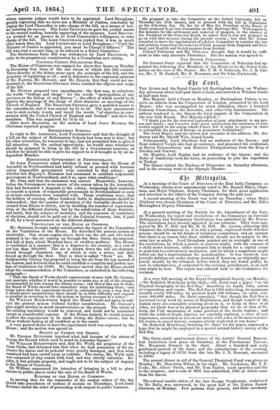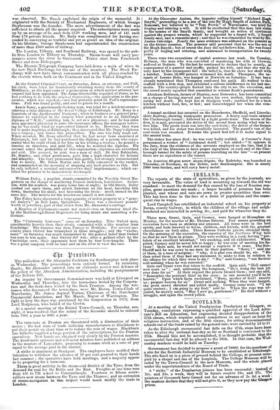Mernintio.
At a meeting of the Court of Directors of the East India Company, on Wednesday, thanks were unanimously voted to Mr. Russell Ellice Chair- man, and Major Oliphant, Deputy Chairman, for their great application and attention to the affairs of the Company during the past year.
A second meeting of the Court was held on Thursday ; when Major Oliphant was chosen Chairman of the Court of Directors, and Mr. Elliot Macnaghten Deputy Chairman.
At a general meeting of the Society for the Amendment of the Law, on Wednesday, the report and resolutions of the Committee on Juvenile Delinquency and Reformatory Institutions was submitted by Mr. Power. The resolutions have already appeared in our columns. They were sup- ported by Mr. F. Dill and Mr. M. D. Hill. Mr. Ayrton, observing that whatever the reformatory is, it is still a prison, expressed doubt whether prisons should be in the bands of voluntary committees, and an opinion that there is no reason why these children should not be subject to the same law as adults. Lord Brougham pointed out an oversight in one of the resolutions, by which a justice or justices might, with the consent of a child under fourteen, either sentence him to death for a capital crime or send him to a reformatory institution, and by which a magistrate might inflict one day's imprisonment for manslaughter. It was resolved, that juvenile delinquents under sixteen (instead of fourteen, as originally pro- posed) should, by the tribunals before which they are found guilty, be sent to reformatories, or subjected to the existing punishment, as in each case might be best. The report was referred back to the Committee for revision.
At a very full meeting of the Royal Geographical Society, on Monday, —Sir Roderick Murchison in the chair,—Dr. Buist read a paper "on the Physical Geography of the Red Sea," describing its depth, tides, extent of evaporation, and coasts. The Red Sea is 1280 miles long, its maximum breadth nearly 200 miles, its greatest depth 400 fathoms, its cubic con- tents 800,000 miles. Dr. Buist remarked, "that though the Red Sea is traversed every week by scores of Englishmen, and though vessels of the Indian navy are constantly cruising about in it, or lying at Suez or at Aden, we know less of its physical geography than we do of that of Si- beria, the Ural mountains, or some portions of the Arctic regions ; and while the wilds of South America are carefully explored, a tract of vast importance, associated as it is in our minds with some of the most wonder- ful events in sacred history, remains utterly neglected at our doors." Sir Roderick Murchison, thanking Dr. Buist for his paper, expressed a hope that he might be employed in a special natural history survey of the Red Sea.
The thirty-ninth anniversary dinner of the Artists' General Benevo- lent Institution took place on Saturday, at the Freemasons' Tavern ; Mr. Benjamin Disraeli in the chair. About a hundred and sixty gentlemen partook of the feast; and the subscriptions of the evening, including a legacy of 1870/. from the late Mr. J. It. Durrant, amounted to 23921.
The annual dinner in aid of the General Theatrical Fund was given on Monday ; Mr. Monekton Milnes in the chair. Mr. Buckstone, Mr. T. P. Cooke, Mr. Albert Smith, and Mr. Tom Taylor, made speeches suitable to the occasion; and a sum of 500/. was subscribed, 1001. of which came from the Queen.
The colossal marble statue of the late George Stephenson, sculptured by Mr. Baily, was uncovered, in the great hall at the Euston Square terminus, on Monday. Few persons were present, and little ceremony was observed. Mr. Geach explained the origin of the memorial. -It originated with the'Society of Mechanical Engineers, of -which George Stephenson was the founder. The mere advertisement of the fact was stcient to obtain all the money required. The subscriptions were made up by an average of 2s. each from 5150 working men, and of 141. each from 178 private friends. Mr. Baily was complimented for having suc- ceeded in. conveying so truthful and yet so grand an idea of the original. hr his lifetime, George Stephenson had superintended the construction of mere than 2500 miles of railway.
The London, Tilbury, and Southend Railway, was opened to the pub- lic from London to Tilbury on Thursday. Steam-boats will carry pas- sengers across the river to Gravesend. Trains start from Fenchurch Street and from Bishopsg,ate.
The Electric Telegraph Company have laid down a main of wires to the new Stock Exchange for the use of the members. The Stock Ex- change will now have direct communication with all places reached by the electric wires, both on the Continent and in the United Kingdom.
At the Central Criminal Court, on Saturday, Jones, an attorney, and Pull, his clerk, were tried for fraudulently obtaining money from the county of Middlesex, as the legal costs of a prosecution in which neither attorney nor counsel had been appointed. The Judge directed the acquittal of Jones, as he had nothing to do with the original transaction,—the application to the pro- secutor, which was rejected,—and bad probably acted on Pull's representa- tions. Pull was found guilty, and sent to prison for a month.
Lewis Bossy, a gentlemanly-looking man, was tried for a misdemeanour— uttering a false diploma of the Royal College of Edinburgh. Mr. Bossy is a licentiate of the Apothecaries' Company ; when in business as a general prac- titioner he exhibited in the surgery what purported to be an Edinburgh diploma of " M.D.," entitling him to act as a physician ; and he has since been appointed physician to some life-instnance offices, the managers believ- ing he was really what he represented himself to be. However, they were led to make inquiries at Edinburgh; they discovered that Mr. Bossy's diploma was a forgery ; and hence this prosecution. The case was fully made out. When arrested, Mr. Bossy admitted that he had never been examined at Edinburgh, but said he had purchased the diploma of a person who repre- sented that he could obtain it for him on his writing a treatise ; he penned a treatise on diarrhcea, and paid 231., when he received the diploma. His counsel urged the probability of this explanation—diplomas are advertised and sold. The accused, he said, was a man of skill. Dr. Guy Babington, Dr. Hanley, and other gentlemen, gave him a high character for honour and integrity. The Jury pronounced him guilty, but strongly recommended him to mercy. Mr. Baron Martin said he fully concurred in the verdict, and commented on the necessity of stopping any such practice as this. But he only inflicted a nominal sentence—two days' imprisonment; which en- titled the prisoner to be immediately discharged.
William Daley, a pugilist, stands committed by the Worship Street Ma- gistrate on the charge of murdering Francis Anderson, hairdresser. Ander- son, with his nephew, was going home late at night ; in Old Street, Daley rushed out upon them, and struck Anderson on the head, knocking him down, fraoturing his skull, and lacerating the brain : death ensued on the same day. The motive for the murderous assault is not stated.
The Police have discovered a large quantity of stolen property at a "gene- ral dealer's" in Bell Lane, Spitalfields. There was a thousand pounds' worth of jewellery, part of that stolen from Mr. Alexander's carriage.
A Member of Parliament—name not stated—was on Saturday fined 40s. by.thellarlborough Street Magistrate for being drunk and assaulting a Po- liceman.
The "University boat-race" came off on Saturday. Nine Oxford men, considerably heavier than their rivals, contended with a like number from Cambridge. The distance was from Putney to Mortlake. For several suc- cessive years Oxford has triumphed in these struggles • and the "excite- ment" on Saturday was much diminished by the general belief that Oxford was sure to win again. And Oxford did win: after a gallant effort by the Cambridge crew, their opponents beat them by four boat-lengths. There WEIS a great company both on land and on the river to view the race.



























 Previous page
Previous page